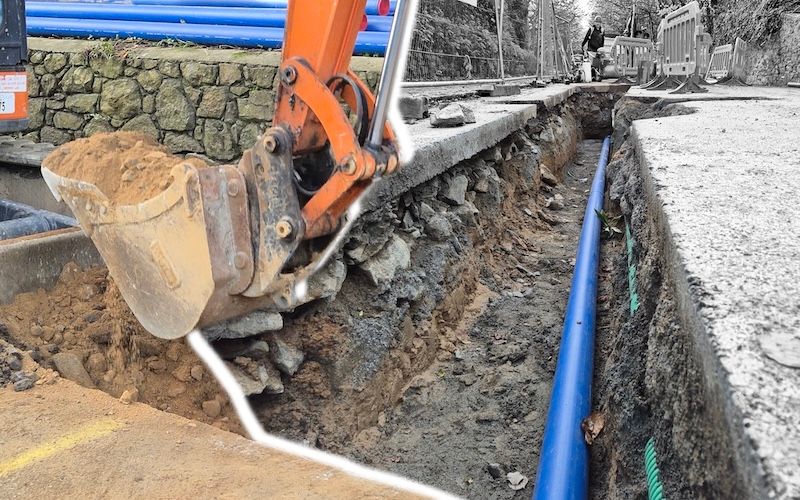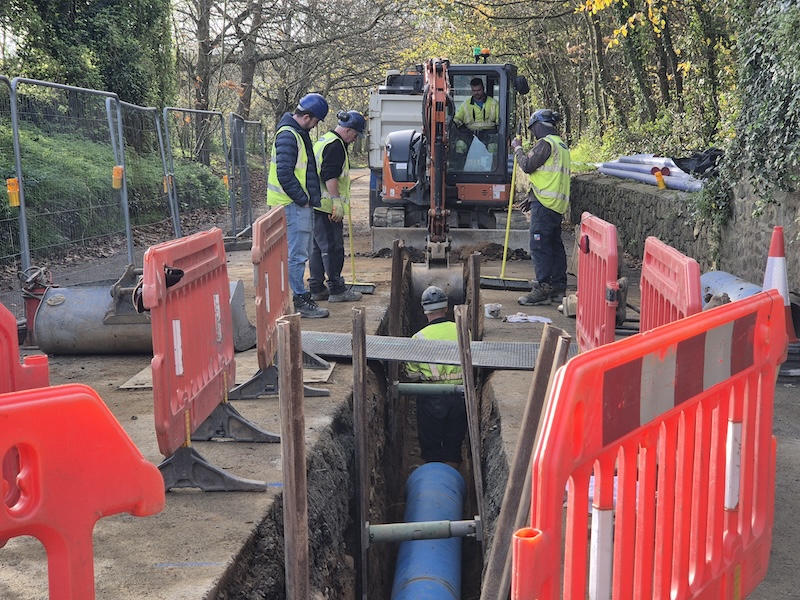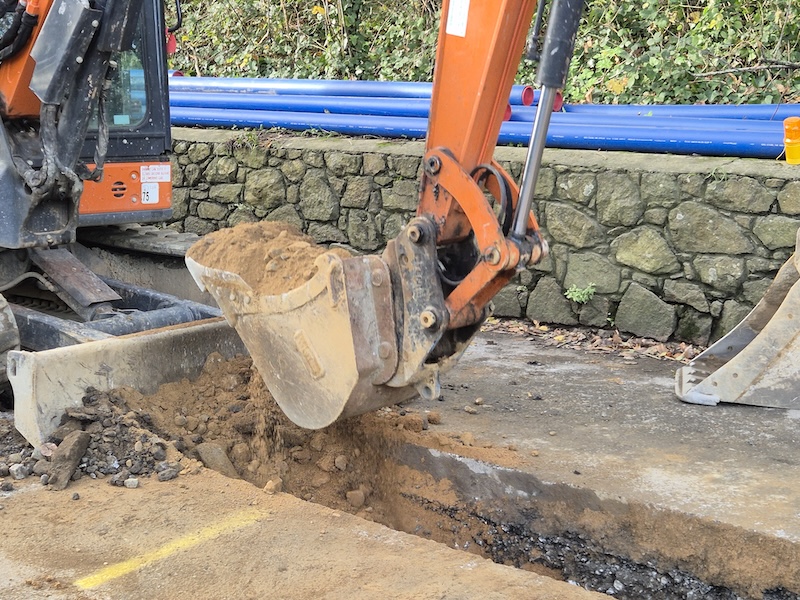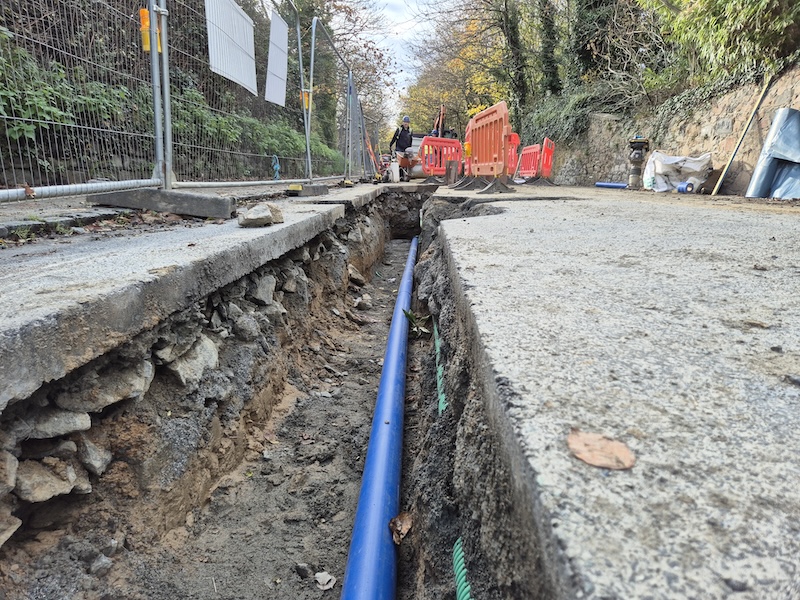


Guernsey Water's ongoing work at Rectory Hill might be causing delays for motorists, but they are a vital part of a wider plan to protect the island’s infrastructure.
“We need to be able to provide water, and particularly acutely, to the northern part of the island, where most of the development is targeted over the next decade or two,” said Carl Falla.
He showed Express what the work entails this week.

Pictured: Workers currently tackling the future proofing of the Islands water supplies.
It's part of a wider project that has been planned over the last two years, and is expected to take five to seven years to complete.
The total work will cost between £9m and £11m, with the first phase - the Rectory Hill closure - due to be completed before Christmas.
Carl Falla is the Capital Delivery Manager for Guernsey Water.
“This particular program of work is planned to provide more water from the central part of the island to the northern part of the island in response to growth," he explained.
“So the island is growing, and it continues to grow. The forecast for population, property development and new dwellings being built across the future means that demand for water is going to change, and to make sure that we are able to meet the island's needs for growth.”
The planning of the work has long been in the pipeline, with years of research culminating in the seven year plan that’s now progressing.
“We have to balance the supply and the demand for water needs across the island for the next 50, 100 years and the infrastructure that we lay has got decades of life," said Mr Falla. "So we need to be able to make sure that we're able to provide water, be sustainable, and resilient for the longer term, and that's where this particular bit of infrastructure comes into the plan.
“There's a huge amount of involvement from a number of areas of organization. We've got engineers, we've got people who are specifying the work. We've got planners who are looking at the very, very long term. We work with statisticians from central government, because this is quite specialist water resource planning. We also bring in consultants where we have a gap to be able to help us develop and forward plan.”
With the trend to complain about roadworks baked into every Guernsey driver, it is of little surprise to hear about that shutting Rectory Hill has caused some disruption.
Mr Falla was keen to emphaise just how important the work is though, and the potential consequences facing residents if it isn’t completed.
“Trunk mains are effectively the motorway of the water distribution network. So they're able to transfer large bodies of water across the island.
“If we weren't able to provide enough water to distribute through these trunk lanes, as the island grows and demand for water increases, particularly in acute areas, we would have potential risks of drops in pressure for customers. That ultimately, the flow and the availability of water would be challenging, and there might be some risks of some customers receiving loss of service.”
Mr Falla was asked if that meant customers could potentially be left without water in some cases.
“That is an absolute risk, and which is why that's a number of years potentially ahead, and why we're starting work now, and we're tracking the change in demand, in population growth and the number of properties that are built, so that we're able to make sure that we manage that risk in a planned way.”

Pictured: The works will cost between £9m and £11m, which will come in the form of a Government loan, and prices increases for customers.
However despite the necessity of the works taking place, Mr Falla is fully aware of the potential impact.
“Closing any road on the island is challenging, and we want to thank islanders for their understanding," he said.
“Looking forward, we plan to stage this work over a number of years. It's five to seven years worth of work. So we will look to target road closures to be able to install the infrastructure as best we can, to limit disruption, and we'll also try to lay infrastructure across private land and public land off of the public highways, to try and minimise that impact as well.
“This project really encapsulates everything Guernsey Water is about: first and foremost, we provide water for life, we have firm financial foundations and we ensure supplies are sufficient and resilient.”
Work like this project, which requires and utilises multiple areas of expertise, and are a necessity to continuing island life as we know it, doesn’t come cheap. The total billing for the seven year project is aimed to land in around the £9m to £11m ball park.

Pictured: Guernsey Water will be announcing more details on the prices rises in the next few weeks, in time for their annually scheduled release.
Mr Falla says that they’ve taken steps to minimise the financial impact, but customers should be keeping an eye on Express for news of price changes.
“This infrastructure is part of our long term investment plan, and it is funded over a number of years. So whilst it's a large amount of investment, it will be delivered over a number of years, and we've taken steps to make sure that we were efficient, and we're able to deliver that infrastructure in a way that doesn't impact bills overly
“Undoubtedly there will be cost changes and an increase to bills at some level, and we've tried to plan these investments so that we mix the costs to be able to provide them between additional income from bill payers and balancing that with borrowing to spread the cost over future generations.
“There is going to be more information that we put out in the near future on costs, as there is typically as part of our normal annual cycle.”
Comments
Comments on this story express the views of the commentator only, not Bailiwick Publishing. We are unable to guarantee the accuracy of any of those comments.